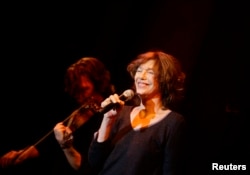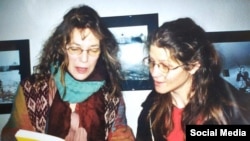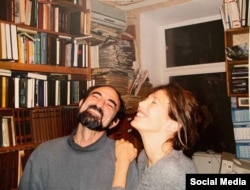Jane Birkin -- the English-French singer, actor, and style icon -- died in Paris on July 16 at the age of 76. Much of the world knows her best for her risqué films and the iconic Hermes handbag that was named for her, while others recall her as a devoted activist for social justice who collaborated with Amnesty International on many issues during her long career.
But fewer people know that the plight of the North Caucasus region of Chechnya, the site of two brutal wars between the Russian military and separatist forces in the 1990s and early 2000s, was particularly close to Birkin’s heart. She recorded a song in Chechen and performed it at concerts where she spoke movingly about the conflict there.
Chechen historian Mairbek Vachagayev worked in 1998-99 as a spokesman for Aslan Maskhadov, the separatist field commander and pro-independence leader who was president of the unrecognized Chechen Republic of Ichkeria from 1997 until he was killed in 2005, and as the self-proclaimed state’s consul general in Russia in 1999-2000.
Vachagayev, who hosts a podcast for RFE/RL’s Caucasus.Realities, crossed paths often with Birkin in the early 2000s and recalls her as “simple woman who spoke out against war in the republic.”
***
In late 2000, when Chechnya was being pounded by Russian shells, I traveled to France for the first large demonstration against the war in the center of Paris. I remember being struck by the large number of celebrities of politics, film, and stage who were there, from philosopher Andre Glucksmann to film star Catherine Deneuve.
Organizers from Amnesty International had to hold back hordes of journalists from the leading outlets of France who crowded around such a diverse array of celebrities who were united in their condemnation of the cruel war in Chechnya.
When a small, thin woman with a quiet voice took the microphone, someone told me: “That is Jane Birkin.”
I acted as if I recognized her, but to be honest, except for Glucksmann and Deneuve, I didn’t know any of the figures who were gathered in front of the Pompidou Center under banners denouncing Russian President Vladimir Putin as a “murderer.”
For the next five years, such anti-war demonstrations were a regular occurrence in Paris. It was never necessary to persuade any of these stars of politics or the arts to support the Chechen fight for independence. All that had to be done was to announce that there would be a rally at such-and-such a place and time and they would show up. And one of the stars who helped us orient ourselves in this unfamiliar France was Jane Birkin.
I first managed to chat casually with Jane in 2002. French journalist Mylene Sauloy had organized a trip to France for the Chechen children’s dance troupe Daymohk, and I was invited.
Jane asked about Chechnya in great detail. She expressed surprise that we were managing to oppose a country that was feared around the world. She was interested in family relations in Chechnya and the role of women. It was clear that she didn’t have much firsthand information. She asked a lot of questions, but all the time she was keeping an eye on the children -- it seemed to her they weren’t eating properly.
The 20 children from villages across Chechnya had been brought to France without any preparation. Because of the war, it had been impossible for them to rehearse in the capital, Grozny. But in the French capital, these children -- fresh from the war -- found themselves at the center of the attention of people who cared and supported them.
Jane immediately decided to organize dinner for them. Jane's mother, outwardly a stern English woman, turned out to be the sweetest person. She bustled about, constantly worrying that there wasn’t enough food and preparing more and more sandwiches.
Jane went from child to child, making sure everyone was eating and drinking. The children soon forgot that they had been told to be on their best behavior and acted naturally as children. Jane played with them just like a child herself. They were all running and playing and laughing loudly. For that one evening, they forgot about the war.
Jane even tried to sing a little in Chechen, with Mylene’s help, provoking howls of laughter from the children with her French-English accent. No one then knew that this impromptu performance would grow into a studio recording partly in Chechen that would be issued as part of a collection of songs in Chechen. She would later perform the song at concerts all over the country.
The children’s performance brought tears to the eyes of many in the audience, including Jane. Each dance by these young people was transformed into a demonstration of the national character and strength of spirit of the struggling Chechens.
Mylene Sauloy and Jane together organized many events to support Chechens. In 2003, Jane performed together with the Daymohk troupe, which had returned to France for another tour.
Mylene has recalled with gratitude how Jane and others helped her organize a tour of France for the 40 dancers, five musicians, and two choreographers. Jane gave ballet slippers to each of the children.
In 2007, Jane helped support Mylene’s project to create the Caravan Of Solidarity Culture, which toured in Georgia, Azerbaijan, and Poland. During the tour, they informed audiences about the war in Chechnya. Jane spoke openly about her desire to travel to Grozny and perform her song in Chechen there.
Subsequently, whenever something was needed to provide help to the Chechens, Jane was one of the first people to be approached. She signed an open letter to the Russian government calling for help in locating Chechen singer Zelimkhan Bakayev, who disappeared without a trace in Chechnya in 2017.
A lot of people remember her as a frail woman with a mighty character, tireless and insistent in her demand for justice and willing to stand up to the mighty of this world.
Aude Merlin, a social-sciences professor at the Free University of Brussels, said Jane symbolized struggle. She told me about a time when Jane was going to perform a concert in the French city of Clermont-Ferrand, where an exhibition devoted to Chechnya was being held.
“Completely unexpected, she showed up shortly before her concert was to begin,” Aude said. “She spoke with all the organizers and the guests, sincerely sharing in their suffering.
“And Jane dedicated the first part of her concert that night to Chechnya and the Chechens. And she performed her song in Chechen,” she recalled.
Aude cannot forget how deeply and personally Jane endured the suffering and tragedy of the Chechens.
“It pained her,” she said.
Aleksandr Cherkasov, a leader of the Memorial human rights group that is now banned in Russia, recalls that Jane signed her first open letter in support of Chechnya in 1999.
Cherkasov first met her in 2000, when he traveled to Paris to spread the word about the massacre of dozens of Chechen civilians in Noviye Aldi by Russian soldiers. Jane’s presence at that event was crucial, he said.
“She took upon herself the role of conveying to the French public the truth about what happened at Noviye Aldi,” he said.
“She was not just a symbol of freedom,” Cherkasov said. “She felt a responsibility to convey the truth about Chechnya. And that is a rare thing among celebrities of her stature.”












